- Details
- Hits: 5053
Station: Calumet, MI (Formerly Red Jacket)
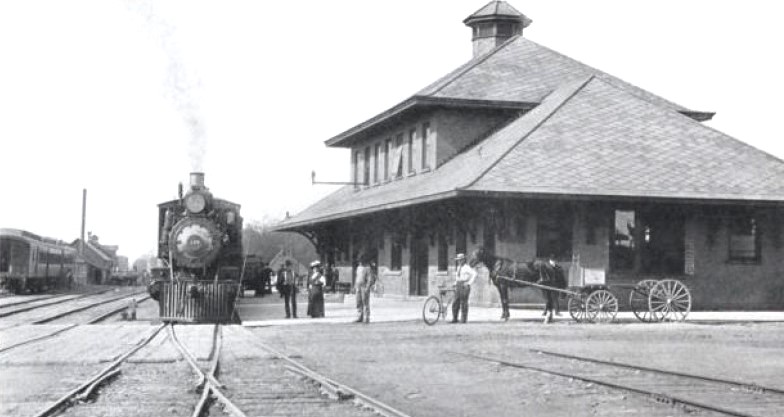
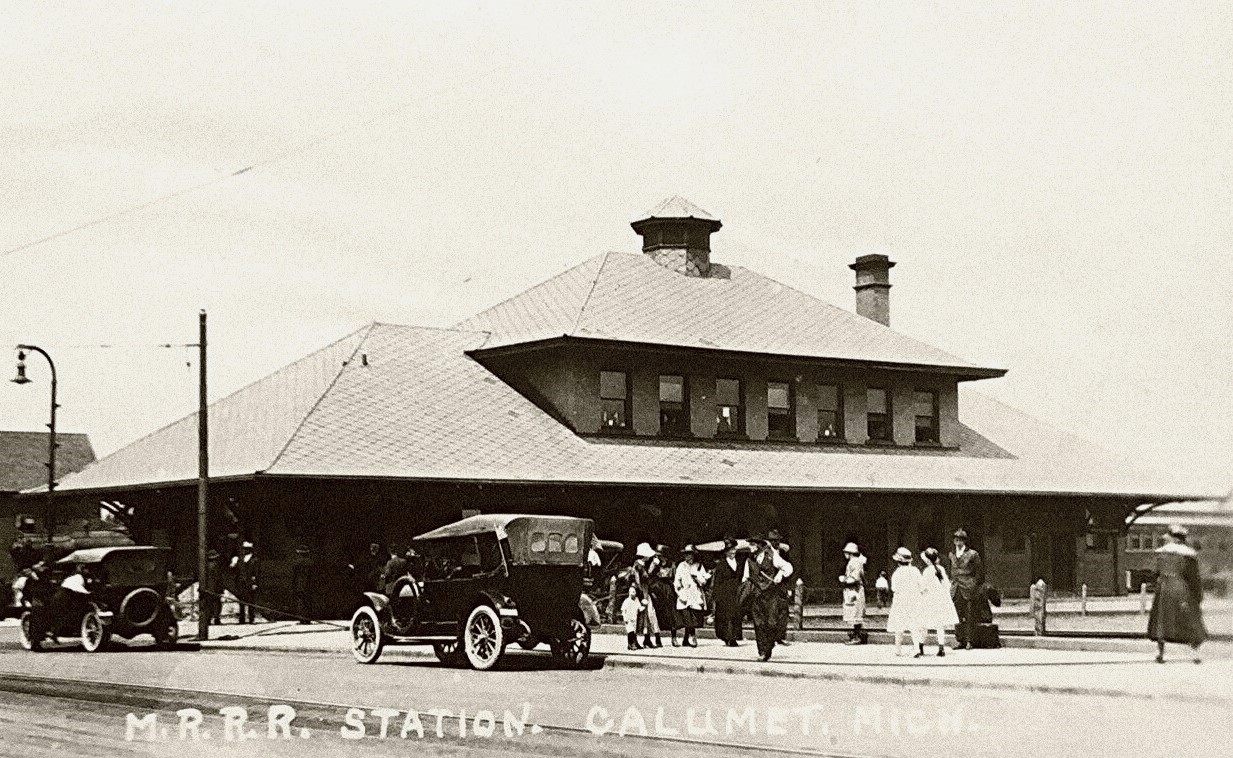
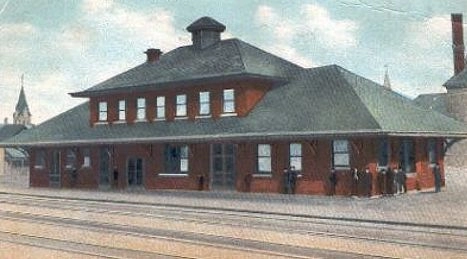
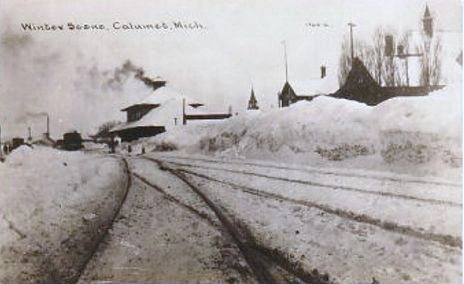
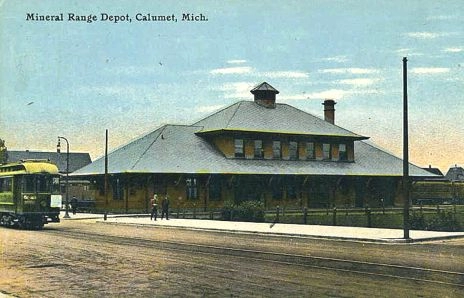
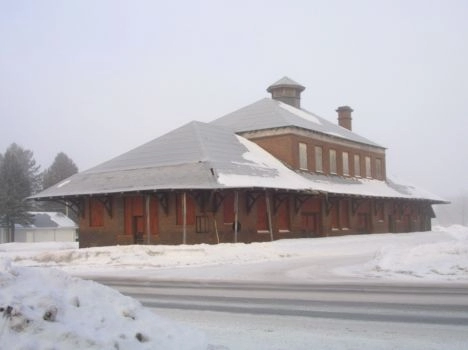
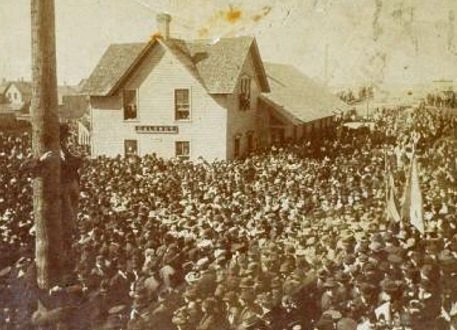
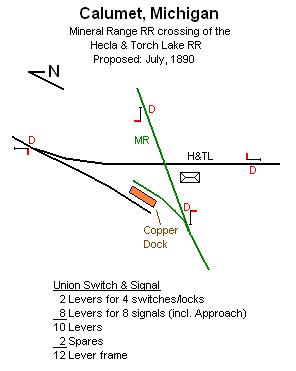
The town was originally called "Red Jacket". The name was formally changed in 1929 to Calumet. [MPN]
Note: Nearby Laurium, MI was also known as Calumet until it was changed to Laurium in 1895.
At the turn of the century, the Calumet area was the third most populated region in Michigan, behind Detroit and Grand Rapids. Today, Calumet has about 1,000 people.
Photo Info: Top, an early view of the Mineral Range depot at Calumet with a train waiting in front. Note the horse drawn dray waiting for freight and the man on his bicycle. This was about 1910. 2nd image, a view of the Calumet station with automobiles in front, suggesting a 1920's date. 3rd image, a postcard view of the Mineral Range depot in Calumet. 4th, a winter scene of the MR depot. 5th, a photo of the same depot with the interurban train nearby. [Alan Loftis collection], 6th, a 2003 photo of the depot. [Dale Berry], 7th photo, a photo of the town saying goodbye to the Light Guard which is heading out by train to Cuba on June 25, 1898 at the old depot in Calumet. 8th photo, a map of the Mineral Range crossing of the Hecla & Torch Lake railroad crossing in Calumet, as drawn from a blue print in the State of Michigan Archives. [Dale Berry]
Notes
The DSS&A station in Calumet was built about 1910 on Oak Street. It was a rectangular brick passenger station 33' wide and 110' long with hipped roofs and overhanging eaves supported by wooden brackets. The center of the station, 45' long, is two stories while the rest is one story. [UPM]
Time Line
1867. Red Jacket was described as a "rough primitive community with little to offer, beyond the basic necessities of life". The 'hotel' was scarcely more than a log cabin at the edge of a primeval forest. [DMG-2021-1106]
1870. Two-thirds of the village of Red Jacket was destroyed by fire. Hundreds fled with possessions they could carry. [DMG-2021-1107]
1873. The original Mineral Range depot here was the Streeter Hotel. Early depots at Hancock and Calumet were described a "tumble-down" sheds not fit for cattle. [SOO-2022-Q1]
1881. A large bar of copper weighing abut 3 1/2 tons was being conveyed from the Central Mine to the Mineral Range railroad depot at Calumet and which required ten horses to draw it. Just as the teams had turned from the country road to the depot, Felix Boulanger, the teamster, who was on the wagon driving the last three teams, was observed to fall off in front of the wagon and before the horses could be stopped the fore wheel of the wagon, the tire of which was six inches wide, had gone over his chest, literally crushing the breath out of his body. The total weight, including the wagon, was about 5.5 tons. Boulanger leaves a wife and four children. [DFP-1881-0510]
1886. A new Hancock & Calumet railroad depot opens in Calumet. It closes in 1888. [SOO-2022-Q1]
1891. John Regan, a brakeman on the Mineral Range railroad, fell from the top of a car while the train was nearing Calumet today and had his skull crushed. He cannot live. [DFP-1891-0523]
1896. June. Almost every day witnesses someone late for either the morning or noon train on the Mineral Range railroad and it is more than amusing to the ordinary onlooker to watch someone run on the platform, all out of breath, and just in time to see the train go around the corner of the base ball park. This noon, a lady came running to the depot, pushing a baby carriage, but the train had gone. A rig was hitched up at Shea's livery and the whole outfit got in and drove through Red Jacket at a pretty swift gait, causing considerable excitement as most people thought it was a runaway. They caught the train at the Laurium station. [CN-1896-0616]
1908. Summer. Construction begins on the new Red Jacket depot, a two-story building with divisional offices on the second floor. It was ready to be opened on December 10, 1908. [SOO-2022-Q1]
1910. September. An organ arrives via the COPR. The new pipe organ for the Pewabic M.E. church arrived Saturday via the Copper Range railroad. It came from the factory at Pekin, Ill. and arrived in first-class condition. [CN-1910-0919]
1913. July. The Miller Carnival company will bring its twenty attractions at noon on the Copper Range railroad. Sites for the shows were selected today. [CN-1913-0719]
1925. Calumet no longer claims distinction as a railroad center of the upper peninsula. The heyday of the Mineral Range railroad, which in pre-war days employed 200 trainmen in addition to 250 men in the shops, with a monthly payroll of $60,000 has passed. The C&H Consolidated Copper corporation has taken over its recently completed rail from Ahmeek to Lake Linden (Trap Rock Valley railroad) and is now hauling its own rock. In years gone by the MR was one of the outstanding industries of the copper country. The points it formerly served are being cared for by the new railroad, with the exception of Mohawk, which is cared for by the Copper Range railroad. However, Calumet will not suffer materially under the new system, as the new railroad has a number of new crews at work. [BCE-1925-0916]
1939. May 22. Due to a subsidence of ground of No. 12 shaft in the area between Calumet and Osceola near the old Osceola depot, train service over the Mineral Range/DSS&A will be suspended for several days between Calumet and Hancock. Mail and express will be taken to Houghton by truck. Passengers will be transported to Houghton by taxi, leaving the MR depot on train schedule time. [IDG-1939-0522]
1940. The separate passenger and freight facilities at Calumet were amalgamated into the existing passenger depot. Passenger equipment laying over was heated by a passenger locomotive instead of the depot's heating plant. [SOO-2022-Q1]
1969. The Soo Line announced plans to close its depot at Calumet because of mine closings by the Calumet Division of Universal Oil Products company. Freight would still be moved to this point but all accounts would be handled by Houghton. The Calumet depot had been in operation continuously since 1872 (97 years). [LSJ-1969-1010]
Bibliography
The following sources are utilized in this website. [SOURCE-YEAR-MMDD-PG]:
- [AAB| = All Aboard!, by Willis Dunbar, Eerdmans Publishing, Grand Rapids ©1969.
- [AAN] = Alpena Argus newspaper.
- [AARQJ] = American Association of Railroads Quiz Jr. pamphlet. © 1956
- [AATHA] = Ann Arbor Railroad Technical and Historical Association newsletter "The Double A"
- [AB] = Information provided at Michigan History Conference from Andrew Bailey, Port Huron, MI

